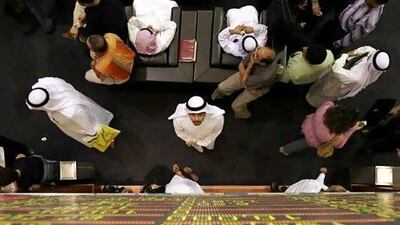In the beginning, the investors were so eager that some slept in their cars to await the IPO. It was 2005, and Abu Dhabi did not have enough hotel rooms to house all the people who had come from Saudi Arabia, Oman and elsewhere in the region seeking a slice of the latest initial public offering - Dana Gas's.
It was a boom time, and Dana offered GCC citizens a special opportunity. One of the few oil and gas producers in the region open to private investors, the Sharjah-based company had a highly publicised plan to import Iranian gas to the Emirates that would help the country to meet its growing energy needs while making a handy profit for investors.
During the IPO week, eager late arrivals - some of them illiterate yet undeterred from getting in on the offering - found standing-room only at the Shuaa Securities offices.
"Everybody was thinking this is like a gold mine now, and everybody needed to be part of it," said Mohammed Ali Yasin, an independent analyst who worked at Shuaa at the time.
"When they subscribed to that, they thought it was going to be another Sabic," he said, referring to Saudi Basic Industries Corporation, Saudi Arabia's largest public company.
The Dana IPO priced shares at Dh1 each. Within a week, the price had shot up to Dh4.98 on the Abu Dhabi Securities Exchange General Index. Dana executives even talked about a second listing in London, and as recently as last year the Financial Times reported that Vallares, the investment vehicle backed by the former BP boss Tony Hayward and the financier Nathaniel Rothschild, was weighing a bid.
Yet today, Dana shares trade at about 40 fils, about one twelfth of the 2005 high. Oil prices in contrast have quadrupled in the same period.
Where did Dana lose its way?
A number of external factors have hurt the company, including the revolution in Egypt last year that has caused payments for Dana's gas production to dry up.
In the semi-autonomous Iraqi region of Kurdistan, where Dana enjoys a strong relationship with the regional government in Erbil and processes nearly all the gas that goes towards producing power for the grid, it has also come up short because of a long-running dispute over oil concessions between Erbil and the central government in Baghdad. The stand-off between the regional and federal government has meant frequent halts in payments for Dana.
The anaemic cash flow has limited Dana's ability to repay a US$920 million (Dh3.37 billion) Islamic bond that comes due in October, just months before Ahmed Al Arbeed,Dana's trusted chief executive, is scheduled to leave.
Advisers to Dana and its bondholders are scrambling to come up with a way to restructure the debt. If they succeed, it would mark the first public bond restructuring in the UAE.
To add to the problems, the Sharjah Government - which holds a 2.2 per cent stake in the company - is threatening to take back a gas concession if Dana does not proceed with developing the field.
"It was a clean company, and I still think it's a clean company," said Tariq Qaqish, the deputy head of asset management at Al Mal Capital. "The problem is that they were working in a very difficult environment."
Dana has yet to unveil publicly a plan to investors on how it plans to manage its various problems. Crescent Petroleum, which owns 21 per cent of Dana, said it would not provide a bailout. Dana declined to comment for this story.
One possible option, according to Mr Qaqish, would be for UAE authorities to press Egypt and Iraq to free up payments to Dana.
"It's not in their favour to have insolvency in a listed company here in the UAE," said Mr Qaqish.
But that leaves unresolved the issue of Dana's gas contract with Iran, which has yet to yield a single cubic metre of gas.
The Iranian contract is at the root of the mismatch between what investors hoped for and what came to be.
Dana's IPO prospectus detailed a 25-year contract with the National Iranian Oil Company (NIOC), the state producer, to pump gas from Iran to Sharjah. It would have been a landmark agreement with NIOC, which the prospectus described as "the entity responsible for ownership and management of the second largest gas reserves in the world".
In turn, Crescent National Gas Corporation, a company co-owned by Dana and Crescent that was the holder of the Iran contract, had also signed long-term supply agreements with government entities in Dubai and the Northern Emirates.
"It was sold to the people that this was the business model and this was the kind of revenue that we expect and it was based on that completely," said Mr Yasin.
But Iran has never delivered on the contract, and Dana has taken the matter to international arbitration.
"That's where a lot of the credibility of the company was hit - and that's when you started to see the dumping of the stock," said Mr Yasin. The finds in Egypt and Kurdistan are not enough to make up for the loss of the Iranian business, he added.
twitter: Follow and share our breaking business news. Follow us
iPad users can follow our twitterfeed via Flipboard - just search for Ind_Insights on the app.

